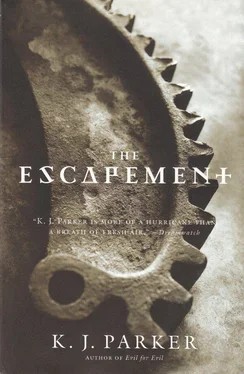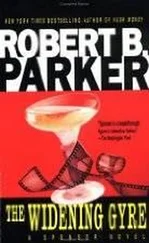K Parker - The Escapement
Здесь есть возможность читать онлайн «K Parker - The Escapement» весь текст электронной книги совершенно бесплатно (целиком полную версию без сокращений). В некоторых случаях можно слушать аудио, скачать через торрент в формате fb2 и присутствует краткое содержание. Жанр: Фэнтези, на английском языке. Описание произведения, (предисловие) а так же отзывы посетителей доступны на портале библиотеки ЛибКат.
- Название:The Escapement
- Автор:
- Жанр:
- Год:неизвестен
- ISBN:нет данных
- Рейтинг книги:4 / 5. Голосов: 1
-
Избранное:Добавить в избранное
- Отзывы:
-
Ваша оценка:
- 80
- 1
- 2
- 3
- 4
- 5
The Escapement: краткое содержание, описание и аннотация
Предлагаем к чтению аннотацию, описание, краткое содержание или предисловие (зависит от того, что написал сам автор книги «The Escapement»). Если вы не нашли необходимую информацию о книге — напишите в комментариях, мы постараемся отыскать её.
The Escapement — читать онлайн бесплатно полную книгу (весь текст) целиком
Ниже представлен текст книги, разбитый по страницам. Система сохранения места последней прочитанной страницы, позволяет с удобством читать онлайн бесплатно книгу «The Escapement», без необходимости каждый раз заново искать на чём Вы остановились. Поставьте закладку, и сможете в любой момент перейти на страницу, на которой закончили чтение.
Интервал:
Закладка:
He sat down in his chair (a Pattern Twenty-Nine, so it was perfectly joined, fitted and finished to within the exacting tolerances of its specification, but that still didn't mean it was comfortable) and tried to twist his mind round to charcoal reserves, but it had seized like a rusty bolt; too much force trying to shift it and it'd shear. He was my friend, he thought. And yes, I betrayed him, for love, but I always thought I knew him well. So why did he make the stupid thing?
A mechanical toy; to be precise, a quarter-size model of an old tramp, with a performing monkey on his shoulder. Turn the key twelve times widdershins, turn up the catch and the monkey danced an awkward, crabbed little dance, while the man's hand lifted up and down, holding a hat to catch coins in. The pattern number was sixty-seven; they were produced mainly for export to the old country, where real monkeys were commonplace and the people were, apparently, easily amused. He thought about that. Ziani would have made all the internal parts himself, but it didn't seem likely that he'd have gone to the trouble of making the castings for the heads, hands and so forth. He'd have had to start off by carving wooden patterns-highly dangerous as well as time-consuming and pointless, since the slightest difference would've marked the thing as an abomination, so clearly that anybody who'd seen the real thing would have noticed. Of course, he could have borrowed authentic castings and taken impressions of them to make his mould. But Ziani had never built a foundry at his home, had he? Surely not. It would have taken up far too much space, and the neighbours would've given him hell because of the smoke. Besides, there had been no mention of aberrant castings in the indictment at his trial.
It followed, therefore, that he'd got hold of genuine castings from someone in the Toymakers'. That on its own should have aroused suspicion; what would an ordnance foreman want with toy components? But supposing he had someone who owed him a favour…
Correction. The shaped outside parts weren't solid castings, they were hollow and pressed out of thin brass sheet on a screw-mill. That made a bit more sense. No bother for someone in the Toymakers' shop to slip a few extra blanks into the mill when nobody was looking, so it wouldn't have to be a very big favour he'd been owed, as would be the case if the parts had been cast.
Falier smiled. When the war started to get serious, the Toymakers' had closed down their pressing and spinning shop. The heavy plant had been moved here, to the sheet-working section of the ordnance factory, and their operators reassigned; now they pressed elbow cops, greaves and tassets out of armour plate, and spun shield bosses and helmet crowns. In which case, the man who'd given Ziani the doll pressings must work here now, under the direction of Superintendent Falier…
An office runner appeared in the doorway, waiting to take the costings up to the Guildhall. Falier handed them over, and said, "And when you've done that…"
(The boy's face fell.)
"I want you to fetch me the record cards on all the tin-bashers who came over from Toymakers' when they closed down the pressings shop. I expect they'll be in the personnel archive. East tower, fourth level. Get someone to help you if you can't understand the filing system."
The boy nodded miserably and slouched away. All right, Falier said to himself, as his eye skipped off the charcoal dockets for the fifth time, maybe I can trace whoever got Ziani the pressings. So what? What do you want them for? Oh, I'm building a Sixty-Seven for my kid; she'd set her heart on one, and you know how much they cost. No, of course I won't mention your name if the shit hits the flywheel.
(Whoever the unknown donor was, he must've been wetting himself ever since Ziani was arrested. Aiding and abetting an abominator-well, he might get off that, if he pleaded ignorance of what Ziani was planning to do, and if he had good friends in the chapel hierarchy. But theft of Guild property, unauthorised supply, breach of trust; enough there to get a man ten years on the treadmills. It'd have to have been a very substantial favour, or else Ziani had known where a body was buried.)
All that for a stupid doll; but if the kid really had set her heart on one, and if she was highly skilled at nagging and Ziani was soft enough, you could just about fool yourself into believing it. But he knew Moritsa. She'd never shown any interest in mechanical toys. Far more likely that she'd think something like a Sixty-Seven was sinister and scary, and burst into tears at the sight of one, rather than persecute her father until he made one for her. Put like that, it simply didn't make sense.
Faced with the impenetrability of that conclusion, he turned away like a horse refusing a jump, and applied himself to charcoal reserves. What charcoal reserves? They were, he realised once he'd unscrewed the figures, desperately short of the stuff, and it was essential. The only alternative was coal, a substance he knew very little about. It was scavenged off the beaches of some province of the old country, shipped across sporadically in huge barges; for three months after a barge convoy had docked, it was cheap and plentiful. Then it disappeared. Charcoal, on the other hand, came in once a month from some huge forest out the other side of the Cure Doce country. The supply was so reliable and the price so stable that nobody ever thought about it. The deliveries still came-an endless line of high, gaunt carts drawn by thin horses, always reaching the City in the early hours of the morning, so they could unload and go away before the streets clogged with traffic; so discreet and invisible, you could easily believe in the Charcoal Fairy-and the quantities and price were exactly the same as ever. That was the problem, since demand had doubled. They needed twice as much of the stuff, preferably at half the price.
He paused, and tried to think clearly. Surely there were other forests, or could you only make it out of certain kinds of tree, or in certain places? Unlikely, but he didn't know. Besides, it wasn't his place to seek out new sources of supply. That was Exchequer's job, or Foreign Affairs (he had no idea whose responsibility it was, assuming it was anybody's; more likely, the charcoal people simply turned up each month as they'd always done, without anybody in the administration organising anything); his role in the great river of supply was to be held responsible for the fall in output when the charcoal ran out.
(I could write a memorandum, he thought. But who would I send it to?)
He heard the sound of a boot-sole on the iron grating outside his door, and looked up. He saw a man he didn't know standing in the doorway; a round, soft, balding man in plain, clean clothes and thin boots, so obviously a Guildhall clerk. Nobody wore anything except steel toecaps in the factory.
"Yes?" he snapped.
"You're Falier."
The voice was mild but not weak. A senior clerk, then; although it was hard to believe that anybody of any importance in the clerical grades would come here himself, unannounced, soiling the soles of his fine shoes with oil and swarf from the factory floor. "That's right," Falier said. After a night in a chair followed by the depressing implications of the breakages list and the charcoal figures, he wasn't in the mood for Authority, and he guessed that anybody who climbed his stairs, even in fancy shoes, was somebody he could be rude to without getting into trouble. "What do you want? Only I'm very busy."
"My name is Lucao Psellus."
Wonderful, Falier thought. I've just insulted the head of state. He jumped up out of his chair and tried to make his mouth work, but it wouldn't.
"Sorry to disturb you." Psellus took a step across the threshold, then stopped. "I know you must be rushed off your feet right now. If it's a particularly bad time…"
Читать дальшеИнтервал:
Закладка:
Похожие книги на «The Escapement»
Представляем Вашему вниманию похожие книги на «The Escapement» списком для выбора. Мы отобрали схожую по названию и смыслу литературу в надежде предоставить читателям больше вариантов отыскать новые, интересные, ещё непрочитанные произведения.
Обсуждение, отзывы о книге «The Escapement» и просто собственные мнения читателей. Оставьте ваши комментарии, напишите, что Вы думаете о произведении, его смысле или главных героях. Укажите что конкретно понравилось, а что нет, и почему Вы так считаете.












